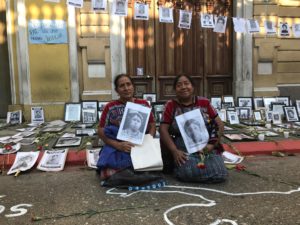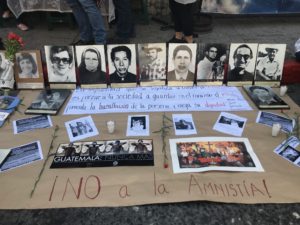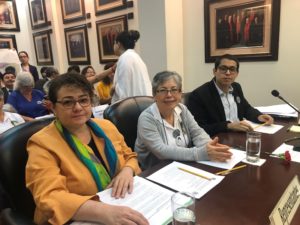A controversial amnesty for war crimes was not approved in the Guatemalan Congress last week amidst an avalanche of international opprobrium.
The proposed legislation would free more than 30 former military officials convicted of human rights violations and a dozen more awaiting trial. It would also end all future criminal investigations into rights abuses from the internal armed conflict, which last from 1960 to 1996. The UN found [pdf] that 200,000 were killed, 45,000 disappeared, and one million forcibly displaced during the conflict, the vast majority at the hands of the Guatemalan army.
Despite the international rebuff of the amnesty bill, including a resolution by the Inter-American Court of Human Rights ordering Guatemala to withdraw the proposal, its supporters say they are not giving up.
“A Return to Total Impunity”
Proponents of the amnesty bill failed last week to secure the third reading that is required before a bill can go up for a final vote and be approved into law. As the leadership moved to debate the amnesty bill, several lawmakers walked out of the Congress, breaking quorum, and forcing the suspension of the legislative session.
The bill passed the first reading on January 17, when a majority of legislators voted in favor of a committee report favorable to the amnesty proposal. Revealing widespread rejection of the amnesty proposal, the second debate was frustrated on three separate occasions. Twice, opposition legislators walked out of the congressional chamber, breaking quorum, and forcing the leadership to suspend the session. The U.S. State Department, the UN High Commissioner for Human Rights, and the Inter-American Commission on Human Rights all called on Congress to refrain from passing the legislation.
On the fourth attempt, amidst a heated debate, the second of three required readings took place on March 6. The congressional leadership placed the bill high up on the legislative agenda scheduled for Wednesday, March 13, signaling their determination to see it pass the third reading and move to a final vote.
Protestors gathered outside the Congress building in the early afternoon Wednesday chanting “no amnesty for war criminals.” About 250 people, many of them survivors and families of victims of human rights violations during the internal armed conflict, had blocked off the street in front of the Congress and created an ad-hoc memorial to the victims of the armed conflict. Photographs of victims of enforced disappearance swung in the breeze and candles burned on the sidewalks in make-shift altars to the disappeared. The protesters began cheering raucously when they heard that the legislative session had been suspended, and the bill did not pass the third reading.
Rosalina Tuyuc, a founding member of the National Commission of Guatemalan Widows (CONAVIGUA) and a former member of Congress, was among those standing in the 80-degree heat in protest of the amnesty proposal. Approval of the amnesty “would be a return to total impunity,” she said. “It would be terrible for all of the victims who have demanded justice. The victims, as well as judges and prosecutors, would be at grave risk.”
International Community: No to Amnesty for War Crimes
Guatemala faced an avalanche of international pressure challenging the amnesty bill as a violation of the rights of victims and an attack against the rule of law.
On Tuesday last week, the Inter-American Court of Human Rights emitted a ruling ordering Guatemala to cease discussion of and to permanently shelve the amnesty bill. This resolution was emitted in the context of a hearing to supervise Guatemala’s compliance with the 2004 sentence in the Molina Theissen case, meaning that compliance is compulsory.
Also on Tuesday, Kimberly Breier, Assistant Secretary of State for Western Hemispheric Affairs, went to Twitter to express the U.S. State Department’s “deep concern over the amnesty for human rights abusers and criminals that would result from the proposed amendment to the national reconciliation law. The U.S. supports Guatemalans in their fight against impunity.” The U.S. Embassy in Guatemala later retweeted Breier’s message.
The UN published a statement calling on authorities, and Congress in particular, to “respect and guarantee the international human rights obligations assumed by the State of Guatemala.” In separate statements, the UN Secretary-General’s Special Adviser on the Prevention of Genocide Adama Dieng and UN Special Representative on Sexual Violence in Conflict Pramila Patten exhorted Guatemala to refrain from passing the amnesty proposal.
The Group of Donors to Central America, known as the G13, also issued a statement, saying: “Providing amnesty for crimes against humanity and freeing those who were already convicted of war crimes and crimes against humanity would contravene Guatemala’s international obligations; would harm reconciliation efforts; and could seriously erode faith in the rule of law in Guatemala.” The statement was signed by Germany, Canada, Spain, United States, France, Italy, United Kingdom, Sweden, Switzerland, the Delegation of the European Union, the Netherlands, and Norway.
Finally, the European Parliament issued a statement calling on Guatemala to reject the amnesty bill, which it said represents “a serious attack on the rule of law” and could lead to instability and possibly even violence. It also called on the government to cease its attacks against the UN-anticorruption body, known as CICIG. The statement warned that the violation of human rights could lead to the suspension of Guatemala’s participation in the Association Agreement between the EU and Central America.
“The Inter-American Court of Human Rights, What’s That?”
The Inter-American Court of Human Rights’ resolution ordering Guatemala to cease discussion of and to shelve the amnesty proposal was published a day after it convened a hearing to supervise Guatemala’s compliance with its 2004 sentence in the Molina Theissen case.
Guatemala has paid reparations to the family and fulfilled a series of symbolic reparations measures, and in May 2018, a Guatemalan court convicted four senior military officials of crimes against humanity and aggravated sexual assault against Emma Molina Theissen and the enforced disappearance of her 14-year-old brother Marco Antonio. However, Guatemala has failed to provide the family any information about his whereabouts or return his remains to the family.
The Center for Justice and International Law (CEJIL), which represents the Molina Theissen family before the Inter-American Court, requested an emergency hearing in February, shortly after the amnesty bill passed its first reading.
Claudia Paz y Paz, former Attorney General of Guatemala and now director of CEJIL’s Mesoamerica program, told the court that the amnesty bill would violate the rights of the Molina Theissen family, as well as thousands of other victims of the internal armed conflict, to access justice, and called on the court to emit an urgent resolution exhorting Guatemala to refrain from approving the amnesty bill.
On Wednesday morning, Edwin Canil, a genocide survivor and president of the Association of Justice and Reconciliation, presented a letter to the congressional leadership notifying them of the court’s order, which was made public on Tuesday, to withdraw consideration of the amnesty bill.
However, the bill’s proponents seemed unmoved by the court’s resolution. When asked by a journalist about the order to shelve the amnesty bill, the president of Congress, Álvaro Arzú said, “The Inter-American Court of Human Rights, what’s that?” He later tweeted: “No national court and much less an international court can limit the constitutional right of the members of Congress to present, debate, or approve legislative proposals. Guatemala is a Republic but above all it is a country that is free, sovereign and independent.”
Advocates of the bill, including deputies Fernando Linares Beltranena of the National Advance Party (PAN) and first secretary of Congress, Estuardo Galdámez, of the official National Convergence Front (FCN-Nación), reiterated that the court should refrain from interfering in Guatemala’s internal affairs. Galdámez affirmed defiantly that he would continue to seek the bill’s approval.
Despite the Inter-American Court resolution and widespread national and international protest, it is still possible that the bill’s proponents will schedule the third debate this week.
Jo-Marie Burt is an Associate Professor of Political Science and Latin American Studies at George Mason University. She is also a Senior Fellow at the Washington Office on Latin America (WOLA). Paulo Estrada is a human rights activist, archaeology student at San Carlos University, and civil party in the Military Diary case.
All photos in this article were taken by Jo-Marie Burt.



